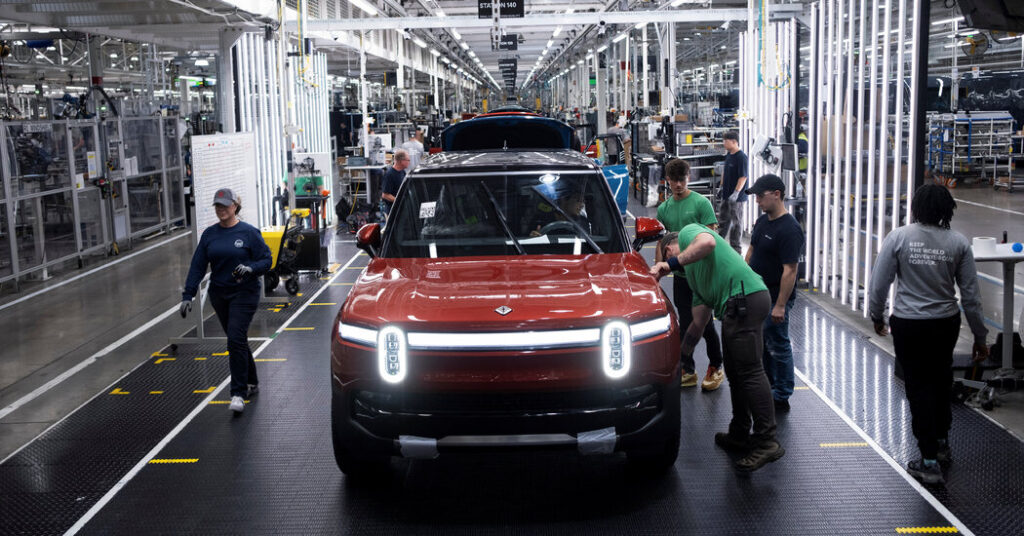German automaker Volkswagen said on Tuesday it will invest up to $5 billion in electric truck maker Rivian, which is struggling to turn a profit, and that the two companies will collaborate on software for electric vehicles.
The deal would create an unusual alliance between the world's second-largest automaker and an electric-vehicle startup that has been struggling to meet investor expectations that it will achieve the kind of success that has made Tesla the world's most valuable automaker.
A successful deal would address weaknesses between the two companies: Volkswagen would gain software expertise that auto analysts say is sorely lacking, and Rivian would benefit from cash and the manufacturing expertise of an automaker that produces nearly 10 million cars a year and is second only to Toyota Motor Corp. in the global auto industry.
Volkswagen said it would invest $1 billion in Rivian initially, increasing that to $5 billion over time. If regulators approve the deal, Volkswagen could become a major shareholder. The cash injection is a major show of faith in Rivian, which is losing tens of thousands of dollars on each car it sells.
Rivian's pickup trucks and sport utility vehicles have won plaudits in the auto media, but the company has struggled to expand production at its Normal, Illinois, factory, and many investors have grown increasingly concerned in recent months that the company may not survive long enough to turn a profit.
Rivian founder and CEO RJ Scaringe said the Volkswagen funding would help the company launch the R2, a midsize SUV that will sell for about $45,000, and finish construction on the Georgia factory, which Rivian halted in March as it sought to save more than $2 billion.
“This is financially significant for us,” Scaringe said of the Volkswagen partnership during a conference call with reporters on Tuesday.
The cheapest vehicle Rivian currently sells, the R1T pickup truck, starts at $70,000, limiting its sales to well-heeled new-car buyers; the R1S SUV starts at $75,000. Even at those prices, Rivian lost $39,000 per vehicle it sold in the first three months of this year.
Rivian shares rose more than 50% in after-hours trading on Tuesday after the deal was announced.
The electric vehicle market is split between younger companies such as Tesla Inc. and Rivian Inc., which make only battery-powered cars, and established automakers such as Volkswagen AG, General Motors Co. and Toyota Co., which often struggle to master new technology.
Other than Tesla, none of the new U.S. automakers specializing in electric vehicles have captured much of the market share, and some, including Fisker and Lordstown Motors, have halted production or filed for bankruptcy.
Auto analysts have long viewed Rivian as one of the electric-vehicle startups most likely to survive, in part because it has raised billions of dollars in investments, including from Amazon, which is its largest shareholder and a major customer for its delivery vans.
But Volkswagen and Rivian have very different management styles, which could make it difficult for the two companies to work together: Volkswagen, based in Wolfsburg, Germany, is known for its strict top-down management and is part-owned by the state of Lower Saxony, while Rivian, based in Irvine, California, has a more liberal culture more typical of a tech startup. Rivian said in April it expected to sell 57,000 vehicles this year, far fewer than Volkswagen sold in a week.
Scaringe and Volkswagen CEO Oliver Bloom said the deal came about after the two met at a Porsche customer center and hit it off over their love of cars.
“We think very similarly,” Bloom said on a conference call.
Ford Motor Co. was once a major shareholder in Rivian, and the two companies previously said they would build SUVs together. But those plans never came to fruition and Ford sold most of its stake in Rivian. Ford and Volkswagen have a separate partnership that includes jointly developing and producing electric vehicles.
Volkswagen's partnership with Rivian could encourage other big automakers to consider investing in or partnering with startups like Lucid Motors, a company with much-admired technology but that is unprofitable and struggling to establish itself in a competitive market. Another big automaker, Stellantis, parent company of Chrysler, Fiat and Peugeot, has invested in Chinese company LeapMotor for access to electric vehicle technology.
Volkswagen said vehicles equipped with the software developed by the new joint venture will go on sale in the second half of the decade. Any Volkswagen brand could use the technology, Bloom said, including Audi and Porsche. It could also potentially be used by Scout, the U.S. off-road brand that Volkswagen is reviving at a factory it's building in South Carolina.
However, Volkswagen and Rivian will continue to sell their vehicles separately.

